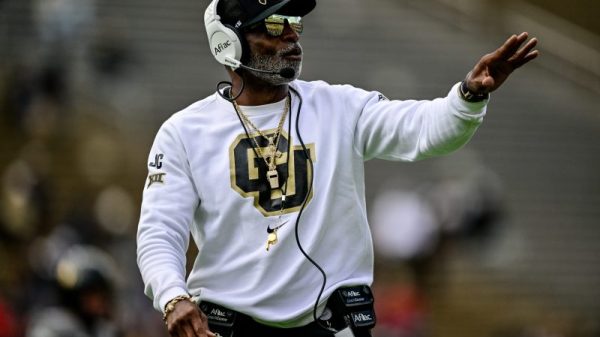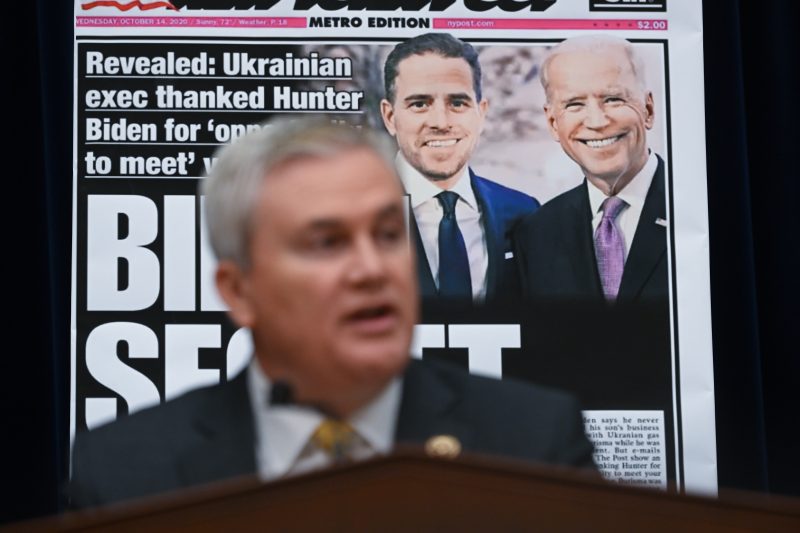It is safe to assume that, at some point in June 2020, the FBI interviewed someone who made an accusation involving Joe Biden.
It’s hard to know much beyond that. The FBI won’t say much about it, despite the energetic prodding of congressional Republicans. At the same time, those same Republicans aren’t interested in sharing with Democrats the details of how they know about this purported interview — very intentionally leaving outside observers with no viable assumption beyond the one identified above.
At the moment the fight centers on a request made by House Oversight Committee Chairman James Comer (R-Ky.) and Senate Budget Committee ranking Republican Charles E. Grassley (Iowa) earlier this month.
The pair sent a letter to the FBI accompanied by a subpoena from Oversight, for a form FD-1023 containing the term “Biden.” In an interview with Fox News’s Sean Hannity this week, Comer alleged that there were so many documents responsive to that request that they were forced to narrow the ask: any document mentioning Biden “and the word ‘five million dollars.’”
If you think that’s vague, fret not. In their initial letter, Comer and Grassley made a specific allegation.
The form, they wrote to Attorney General Merrick Garland and FBI Director Christopher A. Wray, “describes an alleged criminal scheme involving then-Vice President Biden and a foreign national relating to the exchange of money for policy decisions.”
In other words, it alleges a bribe. Allegedly.
This letter was not private. Comer and Grassley sent out a press release about the request, attaching the letter and the subpoena for the media to consume. And at least one media outlet consumed it. Since the beginning of May, Fox News has mentioned “bribe” or “bribery” in the context of Biden more than 100 times. Despite no additional information about the alleged bribe emerging over the subsequent four weeks.
Comer and Grassley insist that’s because the FBI is stonewalling them. But, in a statement to Hannity, the FBI explained why it wasn’t providing any such document to the congressional leaders.
“Releasing confidential source information could potentially jeopardize investigations and put lives at risk,” it explained. “The FBI remains committed to cooperating with Congress’s oversight requests on this matter and others as we always have.”
On the air, Hannity only read that latter part of the statement out loud, to muttered disbelief from his audience. He added, “Well, then hand it over” — as though the reason for not handing it over wasn’t stated in the first sentence.
A form FD-1023 looks like this. (This is a redacted version related to another case made public by the FBI.)
You can see that it includes three components. There’s a header that includes information about the FBI agent conducting the interview and the time and place in which the interview was conducted. (You can see an example here.) There’s the source reporting, which details the information gleaned from the interview. And, finally, there’s a section for agents to sign.
In other words, it is a document that records an allegation and little else. That’s the argument the FBI used to reject the request to release it in the first place.
“An FD-1023 form documents information as told to a line FBI agent. Recording the information does not validate the information, establish its credibility, or weigh it against other information known or developed by the FBI,” FBI acting assistant director Christopher Dunham wrote earlier this month. “The mere existence of such a document would establish little beyond the fact that a confidential human source provided information and the FBI recorded it.”
Comer would later tell Fox’s Maria Bartiromo that his request to the FBI included asking “what did you do to investigate this allegation,” though that’s not included in the actual request. But the FBI’s statement to Hannity covers that anyway.
Since the FBI is a favorite target of the political right — an offshoot of former president Donald Trump’s efforts to undercut various investigations into his activities — Comer and Grassley have insisted that the bureau is intentionally and inappropriately stonewalling them. Comer was on Hannity’s show not to rehash their request (or: not only to do that) but to discuss the possibility of holding the FBI in contempt of Congress.
Remember, there is no public information corroborating the idea that this form even exists beyond the assertions of the House Republicans. That they believe there is such a form, of course, suggests that someone told them about it. And, speaking to Hannity, Comer suggested that someone did. Asked if there might be multiple sources alleging some pay-for-play scheme, Comer said, in essence, maybe — but that “the name of the informant is confidential.”
Indicating that there is an informant. (We should recognize that Comer’s reliability in discussing such an informant is shaky; in the Bartiromo interview, he claimed that the informant was “missing,” but then his staff clarified that he was talking about someone else.)
The existence of an informant would, in years past, have meant that the Republicans would at least have some corroboration to their demands. After all, it was formerly the policy of the House Oversight Committee to share information about whistleblowers between the parties. Under Comer’s leadership, though, that is no longer the case.
The previously agreed-to guidelines stipulated that whistleblowers making claims to the committee majority would be asked if they would share their information with the minority. If they declined to do so, the majority committed to not releasing information publicly without sharing it with the minority first.
There exists a transcript of what was alleged by the whistleblower; Comer told Hannity earlier this month that he’d read such a document. It has not been provided to Democrats on the committee.
In a statement to The Washington Post, a spokesperson for the Democratic minority on the committee suggested that Comer was simply hiding the ball.
“[I]n an effort to maximize innuendo on Fox News and dodge accountability, Chairman Comer has continued to insist he has secret evidence that he has concealed from Committee Democrats and the American public,” the statement read in part. “These tactics reflect Republicans’ willingness to weaponize the Committee to achieve their political ends instead of engaging in responsible oversight.”
At the very least, that Republicans are unwilling to share the allegation does not suggest a lot of confidence that it will withstand skeptical scrutiny.
We might take a step back and note that even what limited information we know invites such scrutiny. There was an allegation made to the FBI in June 2020 impugning a man who’d just become the Democratic nominee for president? It is not hard to imagine a motivation for such a claim to emerge at that time. But this has, of course, not dissuaded the conservative media from embracing the story.
It may be the case that there is a legitimate accusation detailing real wrongdoing that is sitting at the FBI or even currently under investigation by it. A whistleblower complaint offered in the summer of 2019, after all, eventually led to the impeachment of Donald Trump.
But that complaint was detailed, submitted to Intelligence Community Inspector General Michael Atkinson and then conveyed — over the White House’s objections — to congressional committee members. It took less than a month for Atkinson to vet the information and determine that it warranted escalation. Ten days after informing Congress, he was briefing members of Congress behind closed doors.
We know no more now about the purported allegation about Biden than we knew when Comer and Grassley first wrote their letter three weeks ago. Nor do congressional Democrats. So that same idea — maybe something happened? — lingers.



























